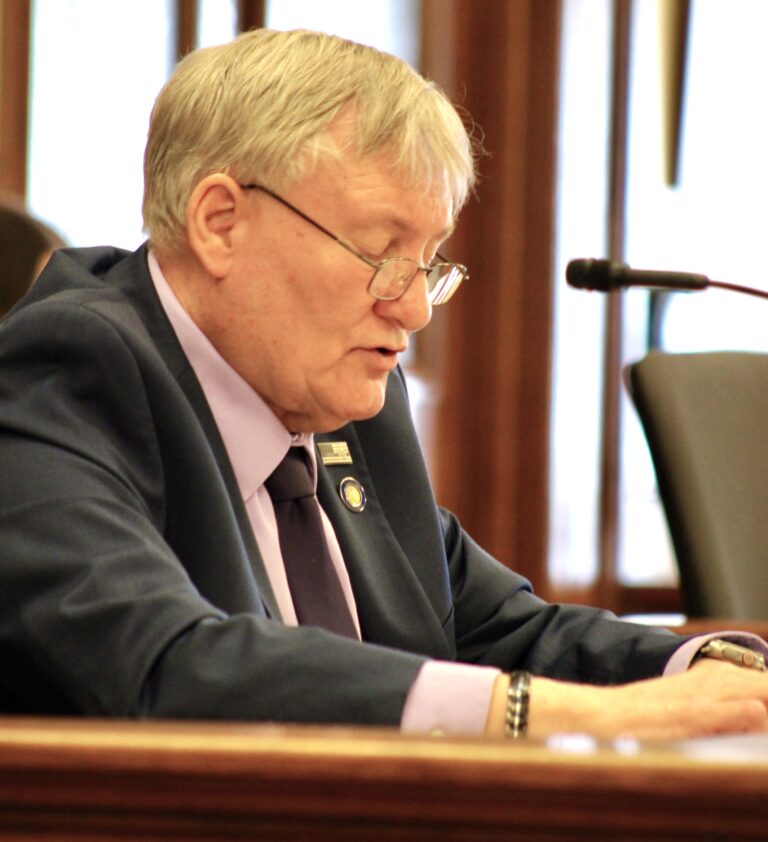The Capitol Report, produced by WisPolitics.com — a nonpartisan, Madison-based news service that specializes in coverage of government and politics — provides a weekly analysis of issues being debated in Wisconsin state government. It is underwritten by the WNA and produced exclusively for its members. WisPolitics.com President Jeff Mayers is a former editor and reporter for the Associated Press and a former political writer for the Wisconsin State Journal.
Most analysts a month ago considered it a longshot that Democratic Gov. Tony Evers would sign a GOP bill containing his legislative maps.
But that’s what happened on Feb. 19, after majority GOP lawmakers decided the Evers maps might not be so bad considering what might come from the newly liberal Wisconsin Supreme Court.
Evers had pressure from those inside his own party who feared the signing of the bill would spur a conservative attempt to challenge his maps in the federal courts. Most Democrats in the Legislature voted against the GOP bill when it passed in mid-February.
But in signing the bill, Evers called it a “beautiful day for democracy” and pledged to fight for way to have fair maps after each federal census — making it less political and subject to legal wrangling. “I—and we—are going to continue our fight for a fair, independent, and nonpartisan redistricting process for Wisconsin,” Evers declared. “If the people of Wisconsin vote to send Democratic
majorities to Madison this November, I’ll tell you right now: one of the first orders of business in our first 100 days together will be enacting a fair, independent, and nonpartisan redistricting system in
Wisconsin.”
Evers hinted at this during a WisPolitics luncheon in Madison in late January. He said at the time he supported Iowa-styled redistricting but had concerns a GOP proposal to implement the practice in Wisconsin wouldn’t guarantee a nonpartisan process.
“The thing that concerns me about it now after being governor is the idea that the Legislative Reference Bureau is nonpartisan,” Evers said referencing that GOP measure would task the LRB with drawing new lines. “Why would anybody believe that when everything that’s been done by this legislature is just the opposite?”
Assembly Republicans introduced a version of the Iowa-styled remap commission in September ahead of the state Supreme Court finding the current legislative maps, which favor Republicans, are unconstitutional. Most Democrats at the time blasted the proposal as a ploy to distract from threats to impeach liberal Justice Janet Protasiewcz over her comments calling the maps “rigged.”
Meanwhile, Senate Majority Leader Devin LeMahieu and Assembly Speaker Robin Vos vowed Republicans would still win majorities in the Legislature under Evers’ maps.
“These maps are not perfect. They are gerrymandered to benefit Democrats. But these maps
have the most competitive districts of the remaining maps the court was considering,” LeMahieu said. “Senate Republicans have won competitive races for twenty years. We don’t plan on stopping now.”
Added Vos: “This fall Republicans will prove that we can win on any maps because we have the better policy ideas for the State of Wisconsin.”
The signing followed Evers’ promise to back his maps if Republicans sent them to him without any changes, and it likely ends the possibility the state Supreme Court will draw lines this fall. It also
put in place lines that will trigger a series of decisions for incumbent lawmakers, including what to do now that they’ve been drawn out of their seats or paired with other incumbents.
Some Democrats have also raised concerns that a challenge to the maps could be filed in federal courts, particularly over the majority minority districts in the Assembly and Senate are constitutional.
But Evers downplayed that possibility.
“I’m thinking that’s a small risk, but if it is, we’ll take it on and win,” Evers told reporters.
Those expecting a federal lawsuit believe some GOP voter could go to federal court to challenge the maps.
Some note the majority minority districts that Republicans drew may have been embraced by the state Supreme Court, but there’s never been a federal case over whether they meet constitutional muster. The conservative majority on the U.S. Supreme Court has ruled what Evers did two years ago was inappropriate when it comes to considering race in drawing lines. It also nixed congressional maps in Alabama and refused to hear a cap involving Louisiana’s lines because Republicans there inappropriately diluted the power of Black voters. But insiders note there’s not a clear marker of where the bright line is.
And Democrats worried about a challenge fear 7th Circuit Court of Appeals Chief Judge Diane Sykes, a former Wisconsin justice, would have the power to pick a conservative-dominated three-judge panel that would hear such a suit. All it would take is for that panel to issue an injunction barring the new maps from being used in 2024 to upend everything, some Democrats warn.
But others counter that there’s simply not enough time for that to play out and that a bipartisan political agreement would deter a court from getting involved.
The Wisconsin Elections Commission has asked that any new maps be in place by March 15 so it can begin implementing them by April 15, when nomination papers can be circulated. And those papers are due back by June 3 since June 1 is a Saturday this year.
Even if a legal challenge was filed within days of the signing, some are skeptical there’d be enough time for a three-judge panel to be appointed, to entertain a request to block use of the new map this fall and to issue an injunction. Every day that the case gets closer to nomination papers going out, the harder it would be to see a federal court step in and switch lines, some argue.
While the Evers map would make wholesale changes to most districts, it would leave the GOP-drawn lines for Assembly Districts 8-12 and 16-18. The same goes for Senate districts 6 and 8. All but one are now represented by Black or Hispanic lawmakers.
The state Supreme Court in 2022 originally picked a map Evers drew, but the U.S. Supreme Court overruled that decision, finding Evers had improperly taken race into account when sought to add a seventh majority-Black district in Milwaukee.
Evers earlier had said he wasn’t worried that the U.S. Supreme Court would have an issue with
his maps because “we’re taking care of the Voting Rights issue.”
The state Department of Justice in a brief submitted in support of Evers’ maps noted there were no changes to those Milwaukee districts and argued, thus, “the proposed maps raise no equal protection issue or other federal issue.”
For more go to www.wispolitics.com
The Capitol Report is written by editorial staff at WisPolitics.com, a nonpartisan, Madison-based news service that specializes in coverage of government and politics and is distributed for
publication by members of the Wisconsin Newspaper Association.



